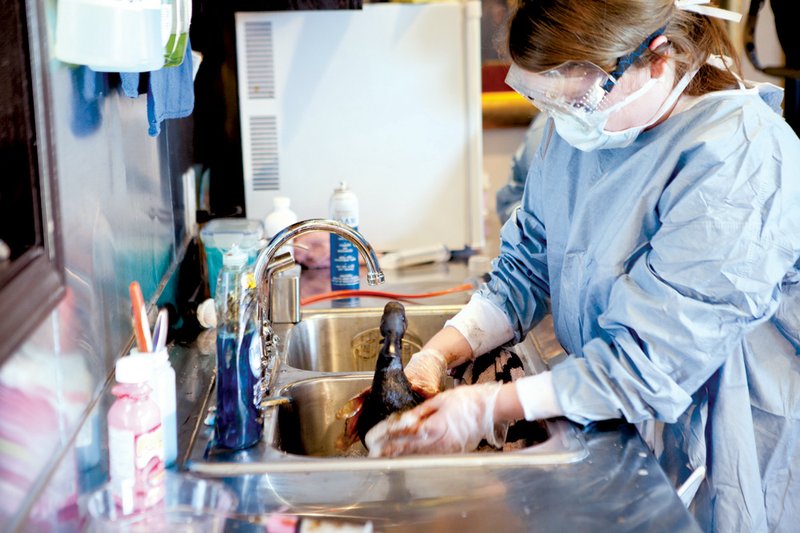As oil poured from a ruptured Exxon Mobil Corp. pipeline into a neighborhood in Mayflower, forcing residents on Starlite Road and Shade Tree Lane to evacuate their homes, other residents also had their habitat and lives threatened — the area’s wildlife.
Though the oil from the March 29 spill had not reached Lake Conway as of Thursday, 16 birds, nine snakes, seven turtles, a muskrat and a beaver had been recovered from the area and taken to animal-rehabilitation sites, Keith Stephens, a spokesman for the Arkansas Game and Fish Commission, said Wednesday. Seven birds were also found dead, he said.
All of the birds that were captured by wildlife rescuers were ducks, with the exception of one American Coot.
Exxon Mobil reported Wednesday that the Environmental Protection Agency categorized the Mayflower spill as a major spill, involving a quantity of oil greater than 250 barrels. Exxon has prepared a response for 10,000 barrels.
Lynne Slater, founder and director of the HAWK Center (Helping Arkansas Wild “Kritters”), along with volunteers from across the state, took care of oiled animals until the Texas-based animal-rescue service Wildlife Response Services took over on Tuesday.
She also said a dead nutria was found Wednesday.
This wasn’t Slater’s first time working with oiled animals, but she said seeing the wildlife that came through the door of the center sparked an emotional response in her.
“If it didn’t make me sad, it would be time to quit doing what I do,” Slater said.
Slater said an Exxon Mobil official called her on Monday. “He said, ‘There are a lot more animals affected than we anticipated.’ I felt a panic in his voice,” she said.
Slater said it underscores the need for HAWK or for Arkansas to have its own wildlife oil-response unit.
“If we had our own mobile unit in Arkansas, we could have responded on Friday afternoon,” she said. “I really think a lot more animals could have been saved.”
When oil covers a bird, Slater said, the waterproofing quality of its feathers is lost.
Volunteers used toothbrushes and Dawn dishwashing soap to dissolve the oil that covered the birds and other animals that were taken to the HAWK Center.
“[The dish soap] breaks up the oil and helps it release from the feathers,” Slater said.
She said the length of time the animals stay with the rehabilitation centers can vary as a result of the extent of the oil on the animals.
“It could be a week or two, up to three months,” Slater said.
The spill has given students in the area a way to get some real-world experience with helping wildlife.
M. Victoria McDonald, associate professor of biology at the University of Central Arkansas in Conway, used the oil spill as an opportunity for her ornithology class to search for wildlife within the oil-spill site.
Students in the class study the biology of birds. A group of her students, along with other interested volunteers from UCA, made their way to Mayflower on Tuesday afternoon.
“It was a good taste of reality,” McDonald said.
Before heading out to the site, McDonald said she briefed her students on how to approach distressed wildlife.
“We found four animals and reported them,” McDonald said.
McDonald said she urged the student volunteers not to touch any animal they found because they did not have a permit to pick up the oiled animals.
UCA graduate student Courtney Dunn has volunteered with the HAWK Center since 2011 because she wanted more experience caring for wildlife.
Dunn went with McDonald’s class to the oil-spill site to search for animals and worked with the HAWK Center to transport animals for rehabilitation.
There is a high potential for the animals to be harmed because of the oil, Dunn said.
“Crude oil is highly toxic to wildlife, [but] one of the greatest dangers is the threat of hypothermia,” Dunn said.
Charlie Engelmann, a spokesman for Exxon Mobil, said the company is doing what it can to help the wildlife.
“We regret that it happened, and we’re doing the best we can to get it cleaned up,” Engelmann said.
Faulkner County Judge Allen Dodson, an avid duck hunter, said he regrets it, too.
“One, it’s too many, and I hate it,” Dodson said. “We’re fortunate it’s not in the middle of a migratory season. One [duck] was a green-winged teal, probably just a local. For whatever reason, some never leave an area.”
Stephens said it is important to leave any wildlife found in the area in the place it was found until a trained professional can pick up the animal.
Oiled animals can be reported to the Exxon claims number at (800) 876-9291.
Staff writer Lisa Burnett can be reached at (501) 244-4307 or lburnett@arkansasonline.com.
Senior writer Tammy Keith contributed to this story.
